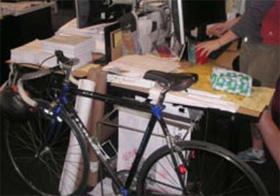Bike-Friendly Zoning Advances to City Council. Bike Access Bill Next?
 Intro 871 would make it much easier to — gasp! — bring your bike to work. Photo: Transportation Alternatives [PDF]
Intro 871 would make it much easier to — gasp! — bring your bike to work. Photo: Transportation Alternatives [PDF]On Wednesday, the City Planning Commission approved a zoning amendment to require bicycle parking in new construction. The City Council now has a 50-day window to vote on and finalize the measure.
Should the zoning amendment pass, it would be good news for New York City bike commuters in years to come. The lack of a secure place to put your ride is one of the main obstacles to commuting by bike, and the zoning change will gradually alter the equation as new housing, workplaces, and commercial development get built. (The amendment now includes exemptions for low-income housing, but not the bike parking-for-car parking swap proposed at a previous hearing.)
A related measure, the Bicycle Access Bill (Intro 871), could deliver immediate benefits to nearly all bike commuters in the city by improving access to existing workplaces. As things stand, most landlords and building managers simply don’t permit people to bring bikes inside. Intro 871, sponsored by David Yassky, would help remedy the situation and has already progressed through one hearing in the transportation committee. A revised version of the bill is expected to be released in the next few days, and Yassky’s office is "very optimistic" that a second committee hearing will take place within approximately six weeks, according to spokesman Danny Kanner.
Intro 871 is one to keep a very close eye on. While a majority of the council has signed on as co-sponsors, the Real Estate Board of New York has signaled its opposition the bill. Not that the pro-bike side is without its own heavy hitters. A group of high-powered business leaders and lawyers sent this letter [PDF, or follow the jump] to Council Speaker Christine Quinn, asking her to continue the "championing of sustainable, healthy and cost effective transportation modes" (disclosure: Streetsblog publisher Mark Gorton is one of the signatories). Quinn’s office has not returned inquiries about her stance on the bill.
Dear Speaker Quinn,
We write to you today as professionals and as cyclists. We are both business people and
lawyers and we wish to be bicycle commuters. Many of our peers as well as employees of the
companies we own, manage, and work for are discovering the physical, mental, and practical
benefits that come with cycling. Yet there is a crucial inequity that separates us from those
who commute by car: secure storage. It is not only this imbalance, but the opportunity for a
solution, that prompts this letter. We urge you to continue your championing of
sustainable, healthy and cost effective transportation modes by supporting City Council
legislation Intro. 871, The Bicycle Access Bill.When people drive to work they have several ways to store their cars. They can look for a
curbside parking space, they can park in an off-street garage, or they may even have a parking
facility in their destination building. Cyclists have to deal with issues of access,
inconvenience, and security. Although the DOT and some BIDs have made great strides in
providing curbside bike racks, supply has not kept up with demand in midtown and the
financial district. Most riders have to chain their bikes to whatever sign, pole, scaffolding, or
rack they can find in the vicinity.A good bike is of value to both its owner and a thief, so many of us are reluctant to leave our
bikes on the sidewalk even when racks are available. The better the bike, the more likely a
theft. Some 70,000 bikes are stolen every year in New York City and less than 2% are ever
recovered. Every time we ride to work, we gamble on whether or not our transportation will be
there for the ride home, many of us will not cycle to work if we can’t park indoors.Bicycle commuting is efficient in many ways. Riding to work allows people who are committed
to fitness, but who work long hours, to combine transportation and exercise. More bicycle
commuters mean fewer private and hired cars on the city’s clogged streets and fewer
passengers on overcrowded subways and buses. Moreover, people who cycle to work have
been shown to be more productive and happier on the job. And, as property owners and
managers who permit access to buildings have already discovered, it will not increase
operational or insurance costs.PlaNYC 2030 calls for the promotion of cycling as a sustainable mode of transportation.
Because Intro. 871 is an important step in achieving this goal, we urge you to support it.